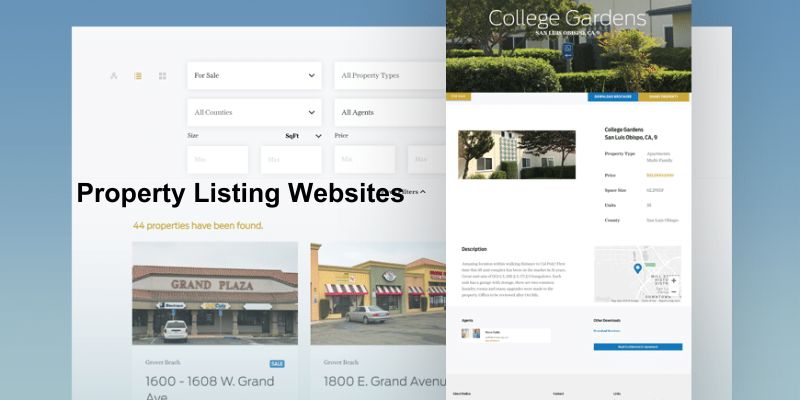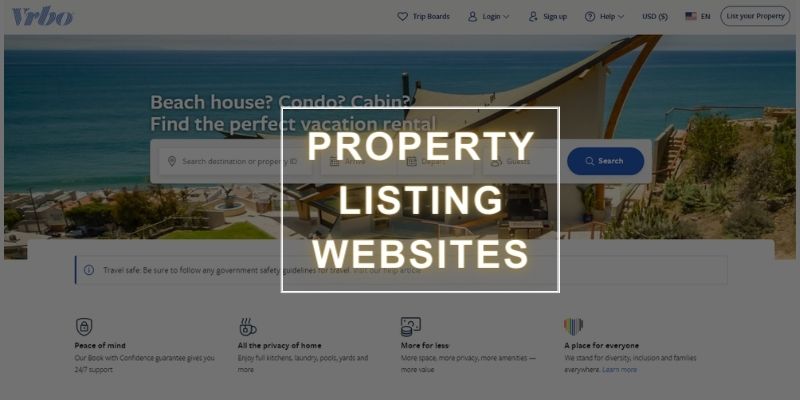In the fast-paced world of real estate, technology has become an integral part of the industry’s landscape. Various types of real estate websites have emerged, each serving a unique purpose within the vast realm of property transactions, investments, and information dissemination. In this article, Ciuc will delve into 10 distinct types of real estate websites, exploring their functionalities, benefits, and how they contribute to the dynamic nature of the real estate market.
10 Types of Real Estate Websites
1. Property Listing Websites
Among the myriad types of real estate websites, property listing platforms stand out as the go-to destinations for individuals seeking to buy or rent a property. These websites, such as Zillow, Realtor.com, and Trulia, aggregate a vast array of listings, offering users a comprehensive view of available properties. Users can filter results based on location, price range, and specific features, streamlining the search process.

In a world where time is of the essence, property listing websites have become indispensable tools for both buyers and renters. The user-friendly interfaces and advanced search functionalities make it easier for individuals to find their dream home or investment property with just a few clicks.
2. Real Estate Brokerage Websites
Real estate brokerage websites serve as the digital storefronts for real estate agents and agencies. Firms like Century 21, Coldwell Banker, and RE/MAX leverage these platforms to showcase their expertise and property portfolios. These websites often feature agent profiles, testimonials, and detailed property listings, creating a one-stop-shop for clients looking to buy or sell real estate.
For real estate professionals, having a strong online presence through brokerage websites is essential for attracting clients and establishing credibility. These platforms not only serve as marketing tools but also contribute to the overall branding and reputation of the real estate agency.
3. Rental Websites
Navigating the rental market can be a daunting task, but rental websites like Apartments.com, Rent.com, and Airbnb simplify the process. Catering specifically to individuals searching for rental properties, these platforms provide detailed information on available apartments, houses, and vacation rentals. Users can explore photos, amenities, and neighborhood details, making informed decisions about their next home.

Rental websites contribute to the fluidity of the real estate market by connecting landlords with potential tenants. The ease of use and comprehensive property information enhance the overall rental experience, fostering transparency and efficiency.
4. Commercial Real Estate Websites
Stepping into the realm of business and investment, commercial real estate websites focus on properties tailored for commercial use. Platforms like LoopNet, CommercialCafe, and CoStar cater to businesses seeking office spaces, retail locations, and industrial facilities. These websites offer advanced search filters, allowing users to find properties that align with their specific business needs.
In the dynamic world of commercial real estate, these websites play a pivotal role in facilitating transactions and negotiations. Businesses can explore a wide range of options, from downtown office spaces to sprawling warehouses, making the process of finding the perfect commercial property more accessible than ever.
5. Real Estate Investment Platforms
Diversifying one’s investment portfolio often includes venturing into real estate. Real estate investment platforms like Fundrise, RealtyMogul, and CrowdStreet provide individuals with the opportunity to invest in real estate projects without the need for large capital. These platforms often operate on a crowdfunding model, allowing users to pool funds for collective investments.
Real estate investment platforms democratize access to the real estate market, enabling individuals to participate in projects that were once exclusive to institutional investors. This type of website introduces a new dimension to the world of investments, offering a gateway for individuals to become stakeholders in real estate ventures.
6. Home Valuation Websites
Understanding the value of a property is crucial, whether for selling, buying, or refinancing. Home valuation websites, including Zillow’s Zestimate and Redfin’s Home Value Tool, provide users with estimates of property values based on various factors such as location, comparable sales, and market trends.
These platforms empower homeowners and potential buyers with valuable insights into property values, allowing for informed decision-making. Home valuation websites contribute to the transparency of the real estate market by demystifying the often complex process of property appraisal.
7. Real Estate News and Information Websites
In the ever-evolving landscape of real estate, staying informed is key. Real estate news and information websites, such as Inman, Realtor Magazine, and The Real Deal, serve as hubs for industry news, market trends, and educational content. Professionals and enthusiasts alike turn to these platforms to stay abreast of the latest developments shaping the real estate landscape.
These websites not only provide news but also foster a sense of community among real estate professionals. The exchange of knowledge and insights contributes to the continuous evolution of industry practices and standards.
8. FSBO (For Sale By Owner) Websites
For those looking to take the reins of their property sale, FSBO websites offer a platform for individuals to sell their properties without the assistance of a real estate agent. Websites like ForSaleByOwner.com and Owners.com empower sellers to manage their listings, negotiate deals, and handle the entire sales process independently.

FSBO websites cater to a niche market of sellers who prefer a hands-on approach to the selling process. While these platforms may not be for everyone, they provide an alternative for those seeking more control and potentially saving on real estate agent commissions.
9. Real Estate Crowdfunding Platforms
In the era of collaborative financing, real estate crowdfunding platforms have gained prominence. Platforms such as RealtyShares, PeerStreet, and CrowdStreet enable individuals to pool their resources for real estate investments. This type of website democratizes real estate investing, allowing a broader range of individuals to participate in projects that were once only accessible to a select few.
Real estate crowdfunding platforms leverage the collective power of investors, making it possible to fund projects that may have otherwise struggled to secure traditional financing. This approach has the potential to reshape the landscape of real estate development and investment.
10. Home Improvement and Design Websites
Beyond property transactions, the real estate journey often involves home improvement and design. Websites like Houzz, HomeAdvisor, and Porch cater to homeowners looking to enhance their living spaces. These platforms connect users with contractors, design ideas, and home improvement professionals, providing a comprehensive ecosystem for home-related projects.
Home improvement and design websites contribute to the holistic experience of real estate ownership. From renovating kitchens to landscaping, these platforms empower homeowners to turn their properties into personalized havens, reflecting their unique tastes and lifestyles.
Conclusion
In conclusion, the diverse array of types of real estate websites highlights the dynamic nature of the industry. From property listings to crowdfunding platforms, each type of website plays a crucial role in shaping the way individuals buy, sell, invest, and interact with real estate. As technology continues to advance, the evolution of these websites will undoubtedly influence the future of the real estate landscape, creating new opportunities and possibilities for industry professionals and enthusiasts alike.
